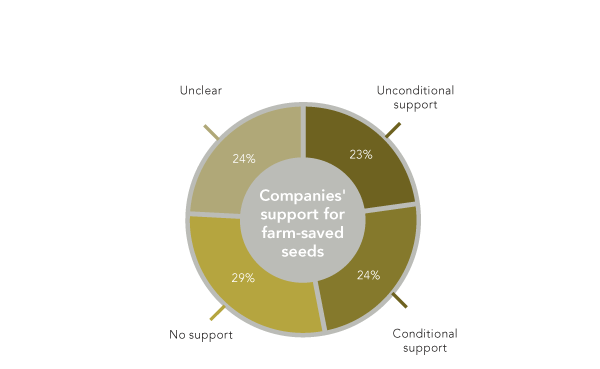The majority of seed companies evaluated in the 2016 Access to Seeds Index support the practice of farm-saved seeds. Yet others argue that this practice does not encourage smallholder farmer productivity.
The practice of farm-saved seeds is widespread in sub-Saharan Africa. A study by Catholic Relief Services (2015) showed that one third of the seeds used by farmers is saved on their own farms. According to international treaties farmers have the privilege to save seeds for their own use.
Farm-saved seeds rank high on companies’ agenda, with 13 out of 17 companies (76%) articulating a position on the issue. Eight companies (62% of those with a position) support the practice, while the remaining five (38%) argue that it does not encourage smallholder farmer productivity.
Most companies that oppose farm-saved seeds explain their stance from a business or environmental perspective. Kenya Seed Company, for instance, does not encourage farm-saved seeds, stating that they provide improved seeds of open-pollinated varieties (OPVs) ‘at affordable rates to farmers in the region’.
Alternatively, Kenya Highland Seed cites environmental reasons, stating that due to the potential loss of traits, farm-saved seeds are ‘detrimental to the income revenues of the farmer and ultimately food security’. East African Seed similarly expresses concerns that farm-saved seeds will result in ‘genetic drift’, as well as reduced crop productivity and farmer profitability. Although companies state that it would be in the interest of farmers to buy new seeds rather than reuse seed, no companies were found to block farm-saved seed practices, for instance through contractual clauses.
One company in the East-African ranking underlined the relevance of farm-saved seeds for preservation of diversity and land races.




